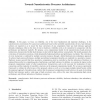Free Online Productivity Tools
i2Speak
i2Symbol
i2OCR
iTex2Img
iWeb2Print
iWeb2Shot
i2Type
iPdf2Split
iPdf2Merge
i2Bopomofo
i2Arabic
i2Style
i2Image
i2PDF
iLatex2Rtf
Sci2ools
125
Voted
ET
2007
2007
Towards Nanoelectronics Processor Architectures
In this paper, we focus on reliability, one of the most fundamental and important challenges, in the nanoelectronics environment. For a processor architecture based on the unreliable nanoelectronic devices, fault tolerance schemes are required so as to ensure the basic correctness of any computation. Since any fault tolerance approach demands redundancy either in the form of time or hardware, reliability needs to be considered in conjunction with the performance and hardware tradeoffs. We propose a new computational model for the nanoelectronics based processor architectures, that provides flexible fault tolerance to deal with the high and time varying faults. The model guarantees the correctness of instruction executions, while dynamically balancing hardware and performance overheads. The correctness of every instruction is confirmed by multiple execution instances through a hybrid hardware-time redundancy approach. To achieve high system performance, multiple unconfirmed computati...
Related Content
| Added | 14 Dec 2010 |
| Updated | 14 Dec 2010 |
| Type | Journal |
| Year | 2007 |
| Where | ET |
| Authors | Wenjing Rao, Alex Orailoglu, Ramesh Karri |
Comments (0)

